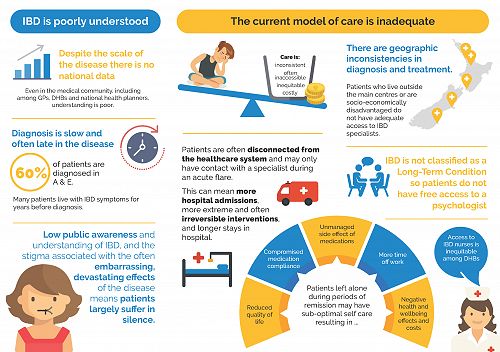
National IBD Care Working Group (NIBDCWG).
CCNZ commissioned economist Dame Suzanne Snively to analyse the economic impact of IBD in NZ. Her report entitled “Reducing the Growing Burden of IBD in New Zealand” was presented at a function held at Parliament in November 2017.
One of the recommendations was to establish a National IBD Care Working Group and this is now in place. The current members are: Hon Peter Dunne (Chair) Dr Richard Stein, Dr Malcolm Arnold, Associate Professor Andrea ‘t Mannetje (Massey University), Brian Poole QSM, Kirsten Arnold, IBD nurse (Canterbury DHB), and Belinda Brown (Secretary). The Group meets using Zoom 3-4 times a year. Some current Agenda items are:
IBD Research
With the support of the Working Group, Professor Andrea ‘t Mannetje of Massey University, also a member of the group, has been awarded a $250,000 grant by the Health Research Council to look at the feasibility of using the Statistic NZ’s Integrated Data Infrastructure (IDI) database to study Crohn’s and colitis in New Zealand. This will, hopefully, provide accurate information on the incidence, prevalence, and demographics of people with IBD in our country and, eventually lead to improvements in medical treatment and our understanding of these diseases.
Biosimilars
Biosimilars are biological therapies that are copies of currently approved biological medications (like infliximab and Humira). Biosimilars are generally considered to be as safe and as effective as the original drugs, but, unlike generic medications, they are not identical.
As biosimilars are presently being considered for use in New Zealand (and may replace our current biologics) owing to their cheaper cost, Dr Stein has prepared a CCNZ position statement on biosimilars which has been approved by CCNZ Board. The statement asserts that it is CCNZ’s position that:
- Non-medical switching from a biological medication to a biosimilar is not recommended.
- Any switch from an originator drug to a biosimilar should only be done with the agreement of both the patient and Doctor.
- Any widescale plan for switching from an originator drug to a biosimilar should be accompanied by a national programme of close patient monitoring, specifically monitoring for loss of efficacy and adverse drug reaction.
- Any cost saving from the introduction of biosimilars for the treatment of IBD should be earmarked for the funding of additional medications to treat IBD.
The position statement has been made known to both Pharmac and the media.
IBD Nurses
IBD Nurses are an invaluable resource to IBD patients all. The availability of IBD Nurses varies significantly from DHB to DHB and we currently have no paediatric IBD nurse in all of New Zealand. The working group is advocating for more IBD nurses across the country and is currently strongly lobbying Starship and Canterbury DHBs to fund paediatric IBD nursing.
Pharmac
The Working Group has maintained regular contact with Pharmac to obtain desperately needed biologic medications that are available in most other OECD countries. The petition for funding ustekinumab originated with the Working group. The Group continues to advocate strongly for standard of care treatment of people with IBD.
National Database and Treatment Guidelines
The group is also working at supporting ongoing efforts in NZ to develop a national IBD patient database and the development of national treatment guidelines.
Gallery


